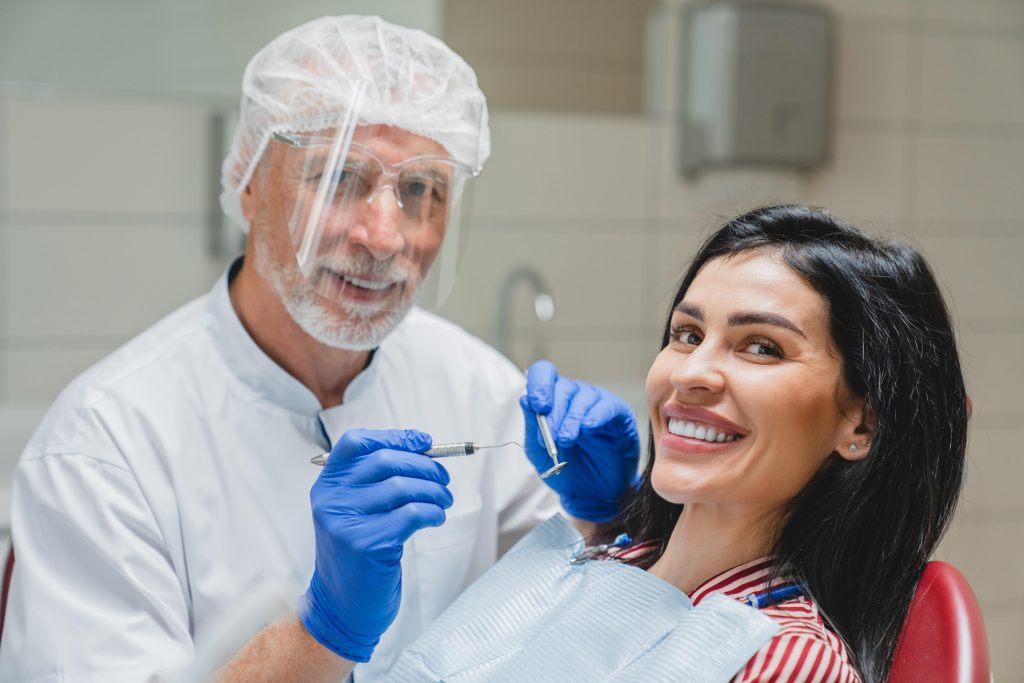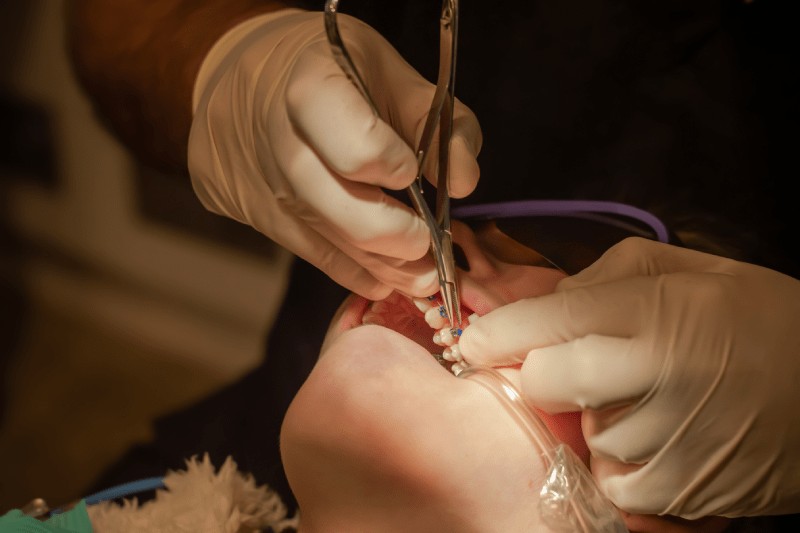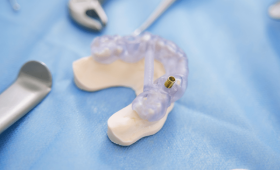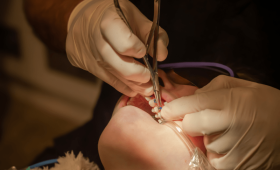What Are Veneers and When Are They Used?
Dental veneers are thin porcelain or composite layers applied to the front surface of teeth to address aesthetic and functional issues. This method is an ideal solution for correcting problems such as tooth discoloration, misshapen teeth, cracks, fractures, or mild crowding.
They are also frequently preferred to close gaps between teeth. Veneers provide a natural and aesthetic appearance to the teeth while offering a durable and long-lasting structure. This procedure is generally performed with a minimally invasive approach, meaning very little or no tooth surface is removed.
What Can Be the Cost of Veneers in Graz, Austria?
In Graz, veneer prices vary depending on the type of material used, the dentist’s experience, and the quality of service offered by the clinic. Porcelain veneers are generally more expensive. The cost of a single porcelain veneer can range from 800 Euros to 1,500 Euros.
This price depends on the quality of the laboratory used and the dentist’s level of expertise. For a total smile makeover, these costs can reach higher figures depending on the number of teeth to be veneered. The location of the clinic and its technological equipment are other important factors that affect prices.
Why Are Veneer Prices More Affordable in Turkey?
The main reasons why veneer prices are more affordable in Turkey include the currency exchange advantage and lower operating costs. For patients coming from countries with the Euro or Dollar, a much more economical treatment is possible due to the value difference of the Turkish Lira. Additionally, the general operating expenses of clinics (rent, staff salaries, taxes) are lower than in European countries. These factors make prices more attractive compared to international standards, despite the use of high-quality materials and services.
What Are the Advantages and Disadvantages of Getting Veneers in Graz?
The biggest advantage of getting veneers in Graz is that the treatment process is local. This means the patient is within their own country, within a familiar healthcare system. There is usually no communication barrier, and the dentist can be easily reached in case of a problem. The disadvantage is that the cost is much higher compared to treatments in Turkey. This can create a significant budget difference, especially for those who want to get multiple veneers, and can make it less accessible.
What Are the Advantages and Disadvantages of Getting Veneers in Turkey?
The biggest advantage of getting veneers in Turkey is, without a doubt, the cost-effectiveness. It is possible to receive the same quality of materials and service at a much lower price than in Europe. Additionally, the experience and expertise of Turkish dentists in this field are very high. Thanks to the popularity of dental tourism, clinics are experienced in serving international patients. Disadvantages may include the addition of travel and accommodation costs and the inability to reach your dentist instantly in case of a problem.
What Are the Main Factors Affecting Veneer Prices?
Many factors affect the price of veneers. These include the type of material used (porcelain, zirconium, laminate, etc.), the number of teeth to be veneered, the dentist’s experience and expertise, the city or country where the clinic is located, and the quality of technology and the laboratory used. The current condition of the patient’s teeth also has an impact on the cost. For example, the need for additional procedures like root canal treatment or fillings before veneering will increase the total cost.
What Are the Main Differences Between Zirconium and Porcelain Veneers?
Zirconium and porcelain are the most common materials used for veneers. Porcelain veneers offer the most aesthetic look, closest to natural teeth, and appear very realistic thanks to their light-transmitting properties. However, zirconium veneers are more durable and harder, which makes them more resistant to chewing forces. Zirconium is preferred for back teeth or in situations requiring strength, while porcelain is ideal for front teeth where aesthetics are a priority. Both materials are stain-resistant and long-lasting.
What Technologies Do Dental Clinics in Turkey Use?
Modern dental clinics in Turkey closely follow the latest technology. Innovative tools such as CAD/CAM systems (computer-aided design and manufacturing), digital smile design, 3D intraoral scanners, and laser technology are widely used. These technologies make the treatment process faster, more precise, and more comfortable for patients. Thanks to digital smile design, patients can see and approve the final result of their veneers in advance.
How Long Does the Veneer Procedure Take?
The duration of the veneer procedure varies depending on the type of veneer and the number of teeth to be veneered. While veneers made with traditional methods can take several sessions, the procedure can be completed in a single day thanks to CAD/CAM technology. Generally, in the first session, the teeth are prepared, and impressions are taken. In the second session, the veneers are tried on and finalized. For those traveling to Turkey, this process is usually planned to take between 3-7 days.
How Many Sessions Are Required for Veneers?
The veneer procedure usually requires two or three sessions. In the first session, the dentist performs a minimal preparation on your teeth for the veneers to be placed and takes digital or traditional impressions. These impressions are sent to the laboratory. In the second session, the permanent veneers are tried on and placed instead of temporary ones. If necessary, final minor adjustments are made, and if the patient approves, the veneers are permanently bonded.

Is the Veneer Procedure Painful?
During the veneer procedure, no pain or discomfort is usually felt because the dentist administers a local anesthetic. There might be a slight sensitivity during the bonding of the veneers. After the procedure, temporary sensitivity in the teeth may be experienced, but this passes on its own within a few days. Your dentist will give you the necessary advice to manage this sensitivity. Post-treatment pain is a rare occurrence.
Is the Quality of Veneers in Turkey the Same as in Austria?
The quality of veneers in Turkey can be on par with the standards in Austria. Turkey uses materials and state-of-the-art equipment that comply with international standards. Many Turkish clinics work with materials imported from Europe and the USA and have international accreditations. The important thing is to do research on the references and experience of the clinic and the dentist to make the right choice. Quality is not dependent on the country, but on the expertise of the clinic and the dentist.
Do Veneers Look Natural?
Modern veneers offer an aesthetic that is very close to natural teeth. Especially materials like porcelain and zirconium have the ability to reflect light like natural tooth enamel. For a natural result, it is crucial that the dentist and the lab technician work together to determine the correct color and shape that suits the patient’s face structure, skin tone, and other teeth. Professionally made veneers do not look artificial and blend in with your smile.
Who Are the Most Suitable Candidates for Veneers?
The most suitable candidates for veneers are individuals who are not satisfied with their aesthetic appearance but have good overall oral health. Veneers are ideal for discolored or stained teeth, chipped or fractured teeth, small gaps, or mild crowding. People considering veneers should have good gum health and not have problems like severe teeth grinding (bruxism). The dentist will decide if veneers are suitable for you.
What Should Be Considered Before Getting Veneers?
Before getting veneers, it is very important to conduct thorough research and choose the right clinic. The dentist’s experience, their portfolio of previous work, and patient reviews should be checked. Also, detailed information should be obtained about the materials to be used, the treatment process, and possible additional costs. Good communication with your dentist and getting clear answers to your questions is important for a comfortable treatment process.
How Long Do Veneers Last?
The lifespan of veneers depends on the material used and oral hygiene. Porcelain veneers generally can last 10-15 years or longer, while composite veneers may need to be replaced after 5-7 years. Good oral hygiene (regular brushing, flossing) and dental check-ups extend the life of veneers. Avoiding biting into hard foods and protecting against habits like teeth grinding are also important for the durability of veneers.
Are Veneers Permanent?
Veneers are not permanent. As you age, your gums may recede or your teeth may experience natural wear and tear. Veneers can also wear out, chip, or change color over time. In this case, your dentist will recommend replacing the veneers. Regular dental check-ups are crucial for monitoring the condition of the veneers and diagnosing any potential problems early. Although they are long-lasting, they should be checked and maintained periodically.
What is the Difference Between Veneers and Teeth Whitening?
Veneers and teeth whitening are different methods used to improve the aesthetics of teeth. Teeth whitening uses chemical agents to lighten the color of teeth, while veneers offer a permanent solution to change the shape, size, color, and position of teeth. Teeth whitening is effective for tooth stains, while veneers are used to solve more serious aesthetic problems (fractures, gaps).
What Should a Diet Be Like After Getting Veneers?
In the first few days after getting veneers, it is recommended to avoid very hot or cold foods and drinks to reduce temporary sensitivity. In general, it is advised to stay away from hard and sticky foods for the first 24 hours to allow the adhesive to fully harden. After that, you can return to your normal diet. Taking care not to bite hard-shelled foods with your veneers will extend their lifespan.
What Should Be Paid Attention to in Veneer Treatment?
The most important thing to pay attention to in veneer treatment is the choice of the dentist and the clinic. An experienced dentist will make the correct diagnosis and create the most suitable treatment plan. Also, the quality of the material to be used is important. Cheap materials may be short-lived. During the treatment process, it is important to communicate openly with your dentist, clearly state your expectations, and ask all your questions.
What Are the Advantages of Zirconium Veneers?
Zirconium veneers offer an ideal balance between durability and aesthetic appearance. They have a much more natural look compared to metal-supported veneers because there is no dark line caused by the metal. As a biologically compatible material, it does not cause allergic reactions and is not harmful to gum health. Zirconium is highly resistant to fractures and can withstand chewing forces. This makes it a suitable option for both front and back teeth.
Which Teeth Are Suitable for Laminate Veneers?
Laminate veneers are very thin porcelain layers bonded to the front surface of the teeth and are generally used for aesthetic reasons. These veneers are ideal for closing gaps between teeth, fixing discoloration, minor fractures, or mild crowding, especially in the front teeth. The application of laminate veneers is less invasive compared to other types of veneers because very little or no tooth surface is removed. This is a great advantage in terms of preserving the natural tooth structure.
Do Veneers Protect Against Tooth Decay?
Veneers protect the front surface of the veneered tooth from external factors, but this does not mean that the teeth are completely immune to decay. The natural tooth underneath the veneer can still decay if proper oral hygiene is not maintained. There is a risk of plaque buildup and decay, especially at the junction of the veneer and the tooth. Therefore, even with veneers, regular brushing, flossing, and periodic dental check-ups are of vital importance.
How Does Veneers Affect Gum Health?
Correctly applied veneers do not negatively affect gum health. It is important that the edges of the veneer do not go below the gum line and that they are in full harmony with the gums. A poorly made veneer can cause gum inflammation and recession. Therefore, the experience of the dentist and the precision of the technology used are critically important. Regular brushing and flossing after the procedure help maintain gum health.
What Needs to Be Done Before Starting the Veneer Procedure?
Before starting the veneer procedure, a comprehensive intraoral examination is required. The dentist checks the health of the teeth and gums. If there are cavities, gum diseases, or other oral health problems, these issues should be treated before proceeding with the veneer procedure. Procedures like dental cleaning and whitening can also be done before deciding on the veneer color. This ensures that the veneers are more compatible with the natural teeth and provides a more aesthetic result.

What is the Importance of the Laboratory Used in Veneer Treatment?
The success of veneers largely depends on the quality of the dental laboratory used. Dental lab technicians use the dentist’s impressions to produce the veneers with high precision. High-tech laboratories use digital systems like CAD/CAM to perfect the shape, size, and color harmony of the veneers. A dentist who works with a good laboratory can offer more aesthetic and durable results to their patients. Therefore, the quality of the laboratory should also be considered when choosing a clinic.
What Are the Possible Complications After Veneer Treatment?
Rarely, some complications can occur after a veneer procedure. These include the veneer breaking, the adhesive loosening causing the veneer to fall off, gum inflammation, or increased tooth sensitivity. Additionally, tooth decay underneath the veneers is a rare occurrence. These complications usually arise from an incorrectly applied veneer or a patient not maintaining adequate oral hygiene. Therefore, choosing the right dentist and maintaining good care are very important.
What is the Most Ideal Age Range for the Veneer Procedure?
While there is no specific age limit for veneer procedures, they are suitable for individuals aged 18 and older whose teeth and jaw structure have fully developed. In adolescents whose teeth and jaw development are still ongoing, permanent treatments like veneers may not be able to adapt to changes in tooth structure. The dentist will evaluate each patient’s situation individually and determine the most suitable timing for veneers. Therefore, a comprehensive evaluation is needed before starting treatment for young patients.
Do the Color of Veneers Change Over Time?
Porcelain and zirconium veneers are highly resistant to staining substances like cigarettes, coffee, and tea, and their color does not change over time. These veneers are stain-resistant due to their smooth surface. However, if you have natural teeth next to your veneers, these teeth may stain over time. Therefore, when choosing the veneer color, it should be considered whether the natural teeth will be whitened in the future.
Does Removing Veneers Harm the Tooth Structure?
A veneer is bonded to the tooth surface with a very strong adhesive, and special tools are used to remove it. This procedure generally does not harm the natural tooth structure because minimal preparation is done on the tooth surface. However, using incorrect or forceful methods can damage the tooth surface. The veneer removal procedure should be performed by an experienced dentist. After the veneer is removed, a new veneer or a protective procedure may be needed to restore the tooth to its former state.
Why Are Reviews and References Important for Veneers?
Before getting veneers, checking the references and patient reviews of the clinic and dentist is very useful in the decision-making process. Real patient experiences can give you important information about the dentist’s expertise, the clinic’s hygiene standards, and the quality of service. Photo references allow you to see the dentist’s aesthetic understanding and the results they have achieved for previous patients. This is an important step to choose the right clinic and clarify your expectations.
How to Plan Accommodation and Travel for Veneer Treatment in Turkey?
For those planning to get veneer treatment in Turkey, many clinics offer support with accommodation and travel planning. The treatment package usually includes airport transfers and accommodation. The initial consultation process is generally done online or through photos. Patients should plan their accommodation for a period of 3 to 7 days depending on the duration of the treatment. It is recommended to contact the clinic in advance to discuss these details to make the process easier.
What Materials Are Used During the Veneer Procedure?
The materials used in the veneer procedure vary. The most common ones are porcelain, zirconium, laminate, and composite. Porcelain and zirconium stand out for their durability and aesthetics. Laminate veneers provide aesthetic results with minimal removal. Composite veneers are a more economical option and can usually be completed in a single session. Your dentist will determine the most suitable material for you based on your aesthetic expectations and budget.
What Information Should Be Requested from the Dentist Before Getting Veneers?
Before getting veneers, you should ask your dentist for detailed information about the treatment plan, the materials to be used, the duration of the treatment, the total cost, and possible additional expenses. You should also ask about the dentist’s experience in this field, examples of previous cases, and the clinic’s hygiene standards. Getting clear and satisfying answers to all your questions is an indication that you are working with a trustworthy dentist.
Are Health Tourism Companies for Veneers Reliable?
Many of the health tourism companies that provide services for veneer treatments in Turkey are reliable. These companies organize travel, accommodation, and treatment processes for patients. When choosing a company, it is important to research their references, certifications, and the details of the service they offer. A reliable company provides transparent pricing and supports you throughout the treatment process. However, communicating directly with the clinic is always a better option.
Do Veneers Make Teeth Whiter?
Yes, veneers make teeth whiter and brighter. Veneers are more resistant to stains than natural teeth. Your dentist will determine the most suitable shade of white for you. For a natural look, a color that matches your skin tone and mouth structure is chosen. Your veneers will maintain their brightness and whiteness for a long time without the need for future teeth whitening.
When Is a New Veneer Needed?
A veneer is an aesthetic solution that generally needs to be replaced after 10-15 years. Situations where a veneer needs to be replaced include chipping, cracking, the formation of a gap at the edges, or a deterioration in its aesthetic appearance. Additionally, the edges of the veneer becoming visible due to gum recession may also necessitate a new veneer. Regular dental check-ups are important for identifying these situations.



